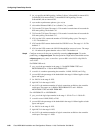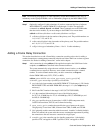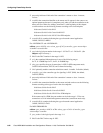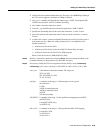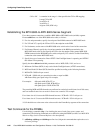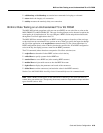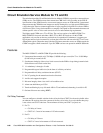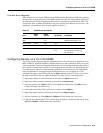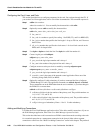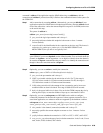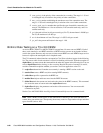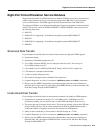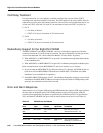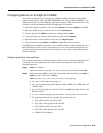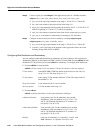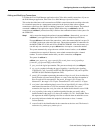
Circuit Emulation Service Module for T3 and E3
Cisco MGX 8850 Installation and Configuration, Release 1.1.00, Part Number 78-6186-02
6-38
Configuring the Card, Lines, and Ports
This section describes how to configure parameters for the card, line, and port through the CLI. If
you use the CiscoView application, refer to CiscoView documentation. The command sequence is:
Step 1 addln <line number>
where line number is 1. You can modify line characteristics with cnfln.
Step 2 Optionally execute cnfln to modify line characteristics:
cnfln <line_num> <line_code> <line_len> <clk_src>
• line_num is 1.
• line_code is a number to specify line coding: 1 for B3ZS (T3), and 2 for HDB3 (E3)
• line_len is a number that specifies the line length: 1 for up to 225 feet, and 2 for more
than 225 feet
• clk_src is a number that specifies the clock source: 1 for local clock sourced on the
PXM, and 2 for looped clock
Step 3 Use dspln or dsplns to check the line. For dspln, the valid line number is 1.
Step 4 Create a logical port with addport:
addport <port_num> <line_num>
• port_num is the logical port number and is always 1
• line_num is the number of the physical line and is always 1.
Step 5 Configure resources at the port level as needed by executing cnfportrscprtn:
cnfportrscprtn <port_num> <controller_name>
• port_num is the logical port number and is always 1.
• controller_name is the name of the network control application. Enter one of the
following strings: PAR, PNNI, or MPLS.
Step 6 Optionally configure Y-cable redundancy if you have connected the lines of adjacent
CESMs through a Y-cable. The applicable commands are addred, dspred, and delred.
These commands run on the PXM rather than the service module, so you must change to
the PXM CLI to execute them:
addred <redPrimarySlotNum> <redSecondarySlotNum> <redType>
• redPrimarySlotNum is the slot number of the primary card. The possible numbers are
1–6, 9–14, 17–22, and 25–30.
• redSecondarySlotNum is the slot number of the primary card. The possible numbers
are 1–6, 9–14, 17–22, and 25–30.
• redType is the type of redundancy. Enter a 1 for 1:1 Y-cable redundancy.
Adding and Modifying Connections
Use either the Cisco WAN Manager application or the CLI to add or modify connections. If you use
the WAN Manager application, refer to the Cisco WAN Manager Operations Guide.
This section describes how to add a connection to a PXM in a stand-alone node according to the rules
for a standard connection or a management connection in the form of either a three-segment
connection or a DAX con. See “Rules for Adding Connections” earlier in this chapter. The preferred



